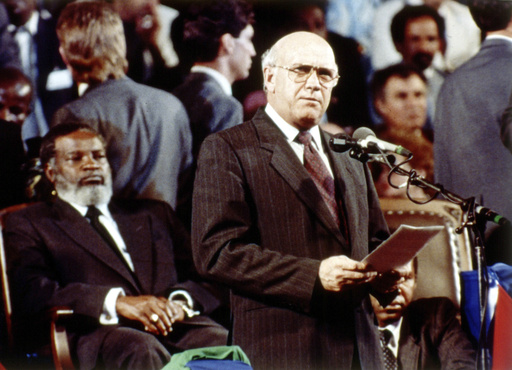
Namibian Independence Leader Sam Nujoma Passes Away at Age 95
OSHAKATI, Namibia — Sam Nujoma, a prominent figure in Namibia’s history and the revered leader who guided the nation to independence from apartheid South Africa in 1990, has died at the age of 95. Nujoma, who served as the first president of Namibia for 15 years and was affectionately known as the “father of the nation,” passed away in Windhoek after being hospitalized for his declining health.
Current Namibian President Nangolo Mbumba announced Nujoma’s death on a Sunday, confirming that he had been under medical care for the past three weeks. Mbumba expressed profound sorrow, stating that “the foundations of the Republic of Namibia have been shaken” by the loss of their founding leader, who “marshalled the Namibian people during the darkest hours of our liberation struggle.”
As the last leader from a generation that played a crucial role in the liberation across Africa, Nujoma stood alongside historic figures such as Nelson Mandela from South Africa, Robert Mugabe of Zimbabwe, Kenneth Kaunda from Zambia, Julius Nyerere of Tanzania, and Samora Machel from Mozambique. He was a commanding presence in Namibia, known for his strong leadership that transitioned the country from colonial oppression under Germany and a grueling independence struggle against South Africa to a stable democracy.
Nujoma dedicated nearly three decades to the independence movement while living in exile. He returned just in time to participate in the first democratic elections in late 1989, which paved the way for his election as president in 1990, coinciding with Namibia’s hard-won independence.
South African President Cyril Ramaphosa praised Nujoma for his leadership in overcoming colonial and apartheid rule, noting that his courage inspired many and accelerated the anti-apartheid movement in the neighboring country. Ramaphosa highlighted that Nujoma instilled a sense of pride and resistance in the Namibian people, making the nation’s independence a catalyst for change in South Africa.
Under Nujoma’s guidance, many Namibians acknowledged his efforts in fostering national reconciliation, especially following the divisions wrought by the years of independence warfare and the apartheid regime’s policies that segregated communities along ethnic lines. Even those who opposed him recognized the importance of the democratic constitution he established, allowing for involvement from various sectors of society, including white business leaders and politicians.
Despite occasional clashes with Western nations, Nujoma was also notable for his bold rhetoric against foreign influence in Namibia. He raised eyebrows at the 2000 United Nations conference when he controversially suggested that AIDS was a man-made virus, and he frequently criticized homosexuality, even banning certain foreign television programming he believed were corrupting the youth.
Nujoma maintained connections with nations like North Korea, Cuba, Russia, and China, which had previously assisted Namibia’s quest for freedom through military support. Nonetheless, he also endeavored to maintain ties with the West, being the first African leader to be welcomed at the White House by Bill Clinton in 1993. Clinton referred to Nujoma as “the George Washington of his country” and acknowledged him as a hero of the global democracy movement.
Recognizing the importance of gender equality, Nujoma promoted the role of women in governance, asserting there were many capable African women ready to lead. Namibia celebrated a historic milestone last year with the election of its first female president, setting the stage for future female leaders like President-elect Netumbo Nandi-Ndaitwah.
Nujoma’s journey began in humble surroundings; he was the eldest of 11 siblings in a rural family. His early experiences revolved around agriculture and livestock before he worked various jobs, including a cleaner for South African Railways. After being arrested for political protests in 1959, he fled into exile, where he co-founded the South West African People’s Organization (SWAPO) and assumed its presidency in 1960. SWAPO has remained the ruling party in Namibia since 1990, and Nujoma led it for an impressive 47 years before stepping down in 2007.
When South Africa ignored a UN resolution meant to end its mandate over Namibia, Nujoma spearheaded SWAPO’s guerrilla warfare. He recounted the meager beginnings of their armed struggle with just a couple of firearms as they sought liberation. Though SWAPO did not achieve a military victory, Nujoma’s political strategies garnered extensive support, ultimately leading to the UN recognizing SWAPO as the legitimate representative of the Namibian populace.
As he navigated the complexities of international relations, Nujoma never forgot his roots and the value of education, striving to improve himself while leading Namibia’s liberation efforts. Reflecting on his life, he remarked, “Others got their education while I led the struggle.”
His enduring legacy as a principal figure in Namibia’s fight for independence and nation-building will be remembered and celebrated for generations to come.

